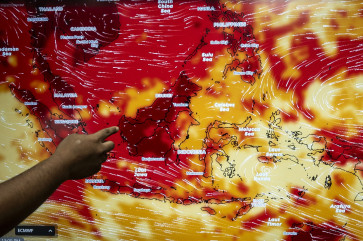SBY's ambition and Myanmar's path
Greetings from Bali: Leaders from the Asia-Pacific Economic Cooperation (APEC) forum pose together before the start of the APEC summit at the Sofitel Hotel in Nusa Dua, Bali, in October 2013
Change Size

G
span class="inline inline-center">Greetings from Bali: Leaders from the Asia-Pacific Economic Cooperation (APEC) forum pose together before the start of the APEC summit at the Sofitel Hotel in Nusa Dua, Bali, in October 2013. The meeting endorsed, among other things, a connectivity framework and multi-year investment plan for infrastructure development to better integrate the region. JP/Jerry Adiguna
As a retired Army general who spent a major part of his military career in the sociopolitical field, especially during the Soeharto era, outgoing President Susilo Bambang Yudhoyono has proficient knowledge about making foreign policy.
If asked about his most impressive achievement in diplomacy, many analysts would not hesitate to cite Myanmar's transformation from a totally isolated state to a more open one.
Myanmar's generals always regarded Indonesia as a role model, especially during the Soeharto era.
Hinging on such an environment, Yudhoyono can well understand the mind-sets of the Myanmar's rulers. His intensive 'constructive engagement' played a crucial role in convincing Myanmar to follow Indonesia's path of democratization.
Since assuming office in late 2004, the President has wanted an outward-looking Indonesia.
Indonesia is the world's third-largest democracy after India and the United States, the fourth-most populous nation, the 16th largest economy, has the world's largest Muslim population, is the largest economy among ASEAN members and a member of the G20, all of which has proven to be crucial working capital for Yudhoyono to increase Indonesia's stature on the global level.
But while the international community has acknowledged Indonesia's growing international clout, the country has failed to use its influence to push for global reform and move beyond the region at a significant level.
Australian National University visiting fellow Dave McRae concluded in a Lowy Institute for International Policy analysis in February that 'Indonesia is unlikely to become a significantly influential actor at the medium term despite its size, strategic location and economic potential.'
The country, said McRae, is 'lacking resources to flex its muscles in support of its ideas', including its economic and military power.
One of Yudhoyono's ambitions was to join BRICS (the club of five emerging economies: Brazil, Russia, India, China and South Africa). He wanted Indonesia to expand its power beyond the ASEAN, while maintaining loyalty to the regional grouping as its core diplomacy base.
However, he has failed to garner sufficient support for entry to the club.
Another catalyst used by Yudhoyono to gain international recognition has been through the capitalizing of natural disasters.
When a tsunami ravaged strife-torn Aceh on Dec. 26, 2004, both the central government and the Free Aceh Movement (GAM) were forced to end the violence. They agreed to sign a peace agreement to the end the nearly three decades of armed conflict. Yudhoyono saw this is a golden opportunity to portray himself as a peacemaker.
Yudhoyono was also very eager to become a peace broker in the Middle East, including in the Palestine issue, in response to demands by domestic Islamic organizations. But it was impossible to become a mediator as Indonesia does not have diplomatic ties with Israel.
Because of it a limited soft power in the Arab world, Indonesia saw the opportunity to strategically participate in promoting the democratization of Arab countries during the Arab Spring. Indonesia can act as a role model for democracy, but it does not have enough resources to exert more power and influence.
In his inauguration speech for his second term in 2009, Yudhoyono expressed belief that Indonesia should have 'a million friends and zero enemies'. This meant that he was not ready to take any risk that could affect his image on the international stage.
Indonesia's foreign policy has always been based on 'non-aligned, free and active' principles. But Yudhoyono is very friendly to the West, especially Australia and the United States, with which Indonesia has a strategic partnerships.
The fluent English speaker has strong ties with the West and also enjoys contact with East Asian countries, especially China, Japan and South Korea.
But if history is taken into account, traditionally Indonesia tends to regard China as a threat to its national security, especially its status as a sub-regional superpower.
Yudhoyono has always been cautious with China. While China is very important to the Indonesian economy, a constant anxiety about China is always present.
Indonesia is not a claimant in the South China Sea disputes, but it is just a matter of time before our national security will also be affected by instability there.
Yudhoyono has kept an obvious distance from overlapping sovereignty claims, but he has always encouraged ASEAN to be united in facing China despite some of its members being involved in the conflict.
Yudhoyono is fond of foreign policy affairs. He has done much for the country, but Indonesia's role and influence remain limited to global affairs.









